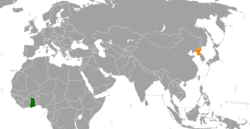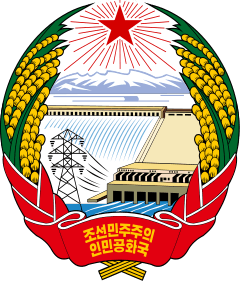Ghana–North Korea relations
Ghana and North Korea established diplomatic relations in 1964.
 | |
Ghana |
North Korea |
|---|---|
| Envoy | |
| N/A | North Korean ambassador to Ghana Kil Mun-yong |
Even before diplomatic relations were established, Ghana had campaigned, along with other African nations, for recognition of North Korea as an observer in the United Nations (UN). Trade relations between the two countries preceded diplomatic relations. North Korea's leader Kim Il-sung shared much in common politically with Ghana's Kwame Nkrumah. After Nkrumah was ousted, North Korea ended up in a diplomatic spat with Ghana, which accused it of training anti-government rebels. By the late-1960s, North Korea was again supporting Ghana as an anti-imperialist force in Africa. In the 1980s, Ghana's Provisional National Defence Council successfully sought aid from North Korea and other socialist countries in order to be more independent from Western powers.
There was a North Korean embassy in Ghana until it was closed down in 1998. The current North Korean ambassador to Ghana is Kil Mun-yong. Trade between the two countries consists mainly of North Korean exports of cement and Ghanaian cocoa, gemstones, and pearls. There is a Korea–Ghana Friendship Association for cultural exchange.[1]
History
In the aftermath of the Korean War, South Korea was granted observer status in the United Nations (UN), but North Korea was not. From the late-1950s to the 1980s a block of Third World countries, including Ghana rallied to condemn the one-sided recognition.[2] In 1973, North Korea was admitted to the UN as an observer.[3]
A tour by North Korean officials to sign trade deals with several West African countries, including Ghana, took place in the summer of 1961.[4] This was before the establishment of formal relations on an ambassadorial level, which happened on 28 December 1964.[5][6]
In the 1960s, North Korea's isolationist policies were viewed favorably in Ghana that professed a similar stance.[7] Kim Il-sung, the leader of North Korea, shared much in common politically with Kwame Nkrumah of Ghana,[8] although the latter never went quite as far in terms of state control over the economy, society, and culture of his country.[9] In July 1966,[10] after the Nkrumah administration had been overthrown,[11] Ghana temporarily terminated relations with North Korea when it uncovered that North Korea was training anti-government guerrillas in Ghana.[10] Similar diplomatic incidents involving North Korea took place in other African countries as well with comparable results.[12]
By 1968, North Korea again voiced support for Ghana. In July, Kim Il-sung launched a slogan: "Cutting off the Limbs of U.S. Imperialism Everywhere" in an effort to establish himself as a leader of the world communist movement. Kim envisioned that Latin American countries could cut off one "arm" of the United States, while African countries such as Ghana would sever the other one.[13]
In 1983, North Korea initiated an agricultural project in Ghana as foreign aid. Around that time, Ghana's Provisional National Defence Council was actively seeking for aid from socialist countries in order to diminish its dependence on Western powers.[14] An agreement on cultural exchange was signed for 1993–1995.[15]
When Ghana established full diplomatic relations with South Korea in 1977,[16] it became one of a limited number of countries that have relations with both North and South Korea.[14]
There was a North Korean embassy in Ghana until it was closed down in 1998.[17] The North Korean ambassador to Ghana since January 2001 is Kil Mun-yong.[18][19]
In 2006, Ghana voted as a non-permanent member of the United Nations Security Council in favor of its Resolution 1718 which imposed sanctions against North Korea.[20] In 2018, Ghana expressed its support for the political process to improve relations between North and South Korea in the midst of the 2017–18 North Korea crisis.[21]
Trade
Ghana has mostly run a deficit in its trade with North Korea, meaning that Ghana is a source of foreign currencies to North Korea. In 2015, North Korea was Ghana's 77th biggest trade partner with $6.8 million in trade.[22] Ghana imports mostly cement from North Korea. It exports mainly cocoa, gemstones, and pearls,[23] but also precious metals.[24]
References
- North Korea Handbook 2002, p. 817.
- Armstrong 2013, p. 223.
- Armstrong 2013, p. 257.
- Armstrong 2013, p. 144.
- Wertz, Oh & Kim 2016, p. 3.
- "Africa". The People's Korea. Archived from the original on 3 May 2015.
- Schaefer 2009, p. 119.
- Smith, Hazel (2015). North Korea: Markets and Military Rule. Cambridge: Cambridge University Press. p. 90. ISBN 978-1-316-23964-3.
- Szalontai, Balázs (2005). Kim Il Sung in the Khrushchev Era: Soviet-DPRK Relations and the Roots of North Korean Despotism, 1953-1964. Stanford: Stanford University Press. pp. 212, 212n8. ISBN 978-0-8047-5322-7.
- Some Facts about North Korea. Seoul: Naewoe Press. 1984. p. 38. OCLC 603996576.
- Owusu-Ansah, David (2014). Historical Dictionary of Ghana (4th ed.). London: Rowman & Littlefield Publishers. p. 240. ISBN 978-0-8108-7500-5.
- Korea Observer. 1. Seoul: Academy of Korean Studies. 1979. p. 71. OCLC 906336418.
- Cha, Victor (2013). The Impossible State: North Korea, Past and Future. London: Vintage. pp. 47–48. ISBN 978-0-099-57865-9.
- Bobiash, Donald (1992). South-South Aid: How Developing Countries Help Each Other. Palgrave Macmillan UK. p. 93. ISBN 978-1-349-11623-2.
- Vantage Point. 16. Seoul: Naewoe Press. 1993. p. 30. OCLC 29800060.
- Daily Report: East Asia, Issue 1, Part 15. The Service. January 4, 1993. p. 30.
- Wertz, Oh & Kim 2016, p. 6n20.
- Africa South of the Sahara 2004. London: Europa. 2003. p. 494. ISBN 978-1-85743-183-4.
- North Korea Handbook 2002, p. 532.
- DuPre, Kasprzyk & Stot 2016, p. 48.
- "Ghana Supports Diplomatic Steps To Solve Issues Of North And South Korea". Modern Ghana. GNA. 24 April 2018. Retrieved 13 June 2018.
- DuPre, Kasprzyk & Stot 2016, p. 31.
- DuPre, Kasprzyk & Stot 2016, p. 32.
- DuPre, Kasprzyk & Stot 2016, Table 5.
Works cited
- Armstrong, Charles K. (2013). Tyranny of the Weak: North Korea and the World, 1950–1992. Ithaca: Cornell University Press. ISBN 978-0-8014-6893-3.CS1 maint: ref=harv (link)
- DuPre, Annie; Kasprzyk, Nicolas; Stot, Noël (2016). Cooperation between African states and the Democratic People's Republic of Korea (PDF). Institute for Security Studies.CS1 maint: ref=harv (link)
- North Korea Handbook. Yonhap News Agency: Seoul. 2002. ISBN 978-0-7656-3523-5.
- Schaefer, Bernd (2009). "Communist Vanguard Contest in East Asia during the 1960s and 1970s". In Vu, T.; Wongsurawat, W. (eds.). Dynamics of the Cold War in Asia: Ideology, Identity, and Culture. New York: Springer. pp. 113–126. ISBN 978-0-230-10199-9.CS1 maint: ref=harv (link)
- Wertz, Daniel; Oh, JJ; Kim, Insung (August 2016). Issue Brief: DPRK Diplomatic Relations (PDF). The National Committee on North Korea. Archived (PDF) from the original on 28 December 2016. Retrieved 19 January 2017.CS1 maint: ref=harv (link)
Further reading
- Kim Il-sung (1989). Answers to questions raised by the editor-in-chief of the Ghana Times, organ of the government of Ghana, October 8, 1981. Pyongynag: Foreign Languages Publishing House. OCLC 777011297.
- Koh, Byung Chul (1969). The foreign policy of North Korea. New York: F. A. Praeger. OCLC 2372.
- Meyer, Joe-Fio N. (1984). Dr. Nkrumah's Last Journey: The Sensational Viet-Nam U.S. War. Accra: Nyaniba Press. OCLC 19575435.
- North Korea Quarterly. 56–59. Hamburg: Institute of Asian Affairs. 1990. ISSN 0340-014X.
- Nylnah, Joe Bradford (December 23, 1997). "President calls for greater co-operation with North Korea". Daily Graphic (1, 4631). Accra: Graphic Communications Group. p. 1. OCLC 54509345.

.jpg)

